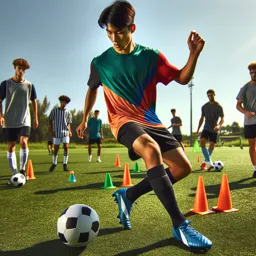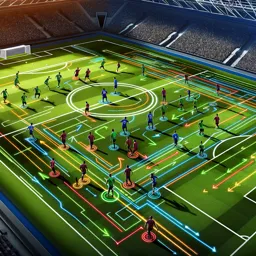Mastering the fundamentals is crucial for achieving success in any sport. These key techniques provide a solid foundation that athletes can build upon as they progress in their training and competition. Whether you are a beginner or an experienced athlete, focusing on the basics can help you improve your performance, prevent injuries, and achieve your goals. Here’s a guide to some essential techniques that every athlete should master.
Proper Form and Technique
- Importance of Proper Form
- Using the correct form ensures that you are targeting the right muscles and reducing the risk of injury. It also helps you perform movements more efficiently and effectively.
- Key Areas to Focus On
- Posture: Maintain a neutral spine and engage your core during exercises.
- Alignment: Ensure your joints are aligned properly to avoid unnecessary strain.
- Movement Patterns: Practice basic movement patterns such as squats, lunges, and push-ups with correct form.
Strength Training
- Building a Strong Foundation
- Strength training helps improve muscle mass, bone density, and overall power. It is essential for enhancing athletic performance and preventing injuries.
- Basic Strength Exercises
- Squats: Focus on form, keeping your chest up and knees in line with your toes.
- Deadlifts: Maintain a neutral spine and hinge at the hips to lift the weight.
- Bench Press: Keep your feet flat on the ground and lower the bar to your chest in a controlled manner.
Agility and Coordination
- Enhancing Agility
- Agility training improves your ability to change direction quickly and efficiently. It is crucial for sports that require quick movements and reactions.
- Agility Drills
- Ladder Drills: Practice various footwork patterns using an agility ladder.
- Cone Drills: Set up cones in different formations and practice sprinting, stopping, and changing direction.
Endurance and Cardiovascular Fitness
- Building Stamina
- Cardiovascular fitness is essential for sustaining high levels of activity over extended periods. It improves heart health and overall endurance.
- Endurance Exercises
- Running: Incorporate long-distance runs and interval training into your routine.
- Cycling: Use stationary or outdoor cycling to build leg strength and cardiovascular endurance.
- Swimming: Offers a full-body workout that is gentle on the joints.
Flexibility and Mobility
- Importance of Flexibility
- Flexibility helps improve the range of motion in your joints, reducing the risk of injury and enhancing overall performance.
- Stretching Techniques
- Dynamic Stretching: Perform before workouts to warm up your muscles and improve mobility.
- Static Stretching: Perform after workouts to cool down and improve flexibility.
Mental Training
- Building a Strong Mindset
- Mental training is just as important as physical training. It helps improve focus, confidence, and resilience.
- Mental Techniques
- Visualization: Practice visualizing successful performances and outcomes.
- Goal Setting: Set specific, measurable, achievable, relevant, and time-bound (SMART) goals.
- Mindfulness: Incorporate mindfulness techniques to manage stress and stay present during competition.
Recovery and Rest
- Importance of Recovery
- Adequate rest and recovery are essential for muscle repair, growth, and overall performance.
- Recovery Techniques
- Sleep: Aim for 7-9 hours of quality sleep per night.
- Hydration: Drink plenty of water to stay hydrated and support muscle recovery.
- Active Recovery: Incorporate low-intensity activities like walking or yoga on rest days.
Conclusion
Mastering the fundamentals of sports training is essential for achieving long-term success and preventing injuries. By focusing on proper form, strength training, agility, endurance, flexibility, mental training, and recovery, athletes can build a solid foundation for their athletic pursuits. Whether you are new to sports or looking to enhance your current performance, prioritizing these key techniques will help you reach your goals and excel in your chosen sport.
































